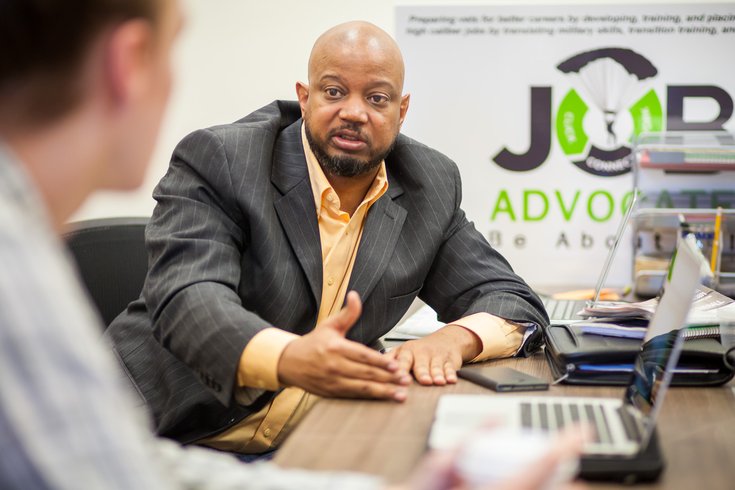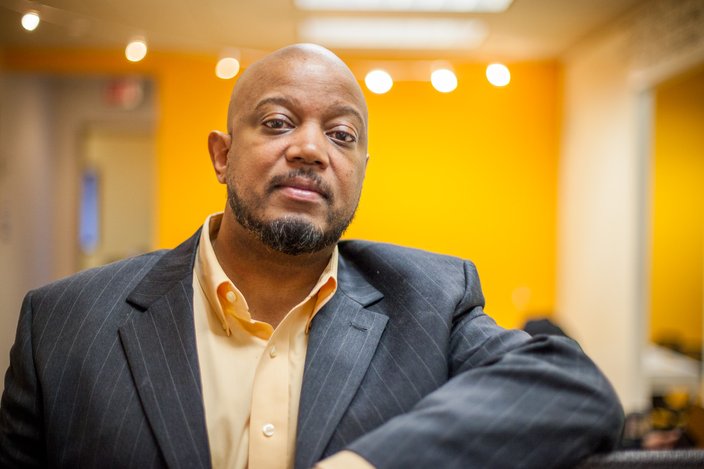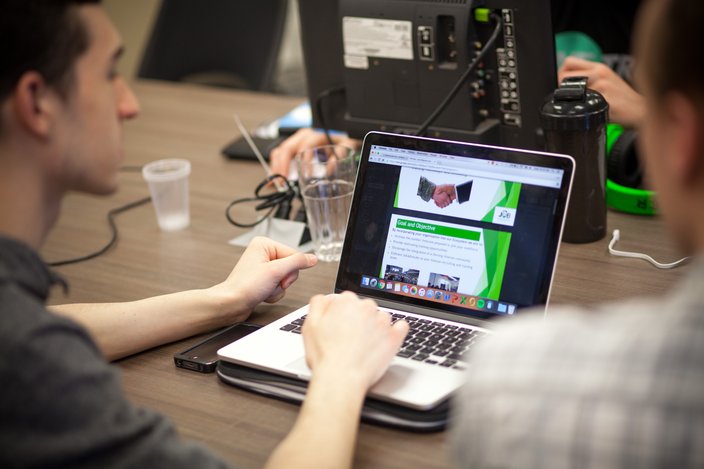
April 15, 2016
 Thom Carroll/PhillyVoice
Thom Carroll/PhillyVoice
Michael Woody speaks with one of his interns from Temple University at Benjamin's Desk, a coworking space in the Curtis Center, where JobAdvocate is located.
The night he introduced himself to his Villanova MBA class, Michael Woody made a private vow that he wouldn’t hold back.
He was there to amplify his job qualifications, he explained, because his struggles to find work in the civilian sector didn’t befit his military background: 20-plus years of service, U.S. Army Ranger School, and tours in Iraq, Panama, South Korea, Kuwait and Bosnia. He was candid, direct and revealing.
His intention wasn’t to shock and awe. It was to educate.
Someone, however, was surprised. Someone who Woody didn’t necessarily risk his life for.
A Chinese woman in the class wore a puzzled expression as she listened to Woody. Her confusion boiled over, and she said loudly: “I do not understand; I do not understand America and why they treat their military people that way.”
In China, she said, everyone else leaves the room if they find out a military veteran is applying for an open position, because they get the job. No questions asked. It’s what is owed them, she clarified, and no one complains.
“They come home, they go to these job fairs and [companies] say they’re hiring veterans and they support veterans, and it turns out to be nothing more than a marketing show. It looks good for these companies to say it, but they’re not doing it. U.S. veterans get a pat on the back, but it’s not enough." – Michael Woody, CEO of JobAdvocate
Woody told her that’s just not the way it is here in America.
The men and women serving this country return to find themselves entrenched in a continuing battle: private wars to attain employment with salaries commensurate to their military experience.
The unemployment rate for veterans who served on active duty in the U.S. Armed Forces at any time since September 2001 — a group referred to as Gulf War-era II veterans — declined by 1.4 percentage points over the year to 5.8 percent in 2015, the U.S. Bureau of Labor Statistics reported in March.
The unemployment rate for veterans remains higher than the national unemployment rate (5.0 percent), the report said.
Moreover, veterans report being “underemployed” at higher rates than the U.S. workforce in general – 14 percent more often overall – according to PayScale data collected and compiled for Veterans Talent: An Open Data Collaboration.
Those disadvantages are what Woody, who served in the U.S. Army as an Airborne Ranger from 1989 to 2010, is trying to change as the CEO of JobAdvocate, a company he formed in 2014 to connect the new generation of veterans to higher quality jobs, and provide leadership and team-building training to corporations.
A graduate of Temple University, with an MBA from Villanova in 2014, Woody said the United States is “not taking care of our veterans."
"I say that because in other countries, they do far more for their veterans than we do here for ours. The twist is, our veterans do far more than veterans from other countries,” said Woody, 46, who was born in Philadelphia, the son of a former Philadelphia police officer and retired Army infantry officer and Airborne Ranger. Woody returned to the area six years ago and currently lives in Drexel Hill, Delaware County.
“They come home, they go to these job fairs and [companies] say they’re hiring veterans and they support veterans, and it turns out to be nothing more than a marketing show," Woody said. "It looks good for these companies to say it, but they’re not doing it. U.S. veterans get a pat on the back, but it’s not enough. A veteran’s resume is not like that cookie-cutter resume you see coming out of college."
 Thom Carroll/PhillyVoice
Thom Carroll/PhillyVoiceMichael Woody, founder of Job Advocate, is a retired U.S. Army Airborne Ranger. He did tours of duty in Iraq, South Korea and Bosnia.
In start-up mode, JobAdvocate is looking for its first clients. Woody has met with the City of Philadelphia, Fortune 500 companies, and small- and medium-sized local companies to begin building employment relationships. He looks at about 20 resumes a day from veterans, and helps them sell their experience to prospective employers.
It can be a tough sell.
“It’s most mystifying to me how they hire someone right out of college where being a lifeguard or working at a bar, or being a teacher’s aide translates into working at Goldman Sachs in the financial analysts’ department," Woody said.
"That doesn’t exist for veterans, who can say that they were at Ramstein Air Base fixing C-130s that are flying missions into Africa, or someone in Special Forces who are warring against drug lords. How do you put that on a resume? What I discovered in my entrepreneurship pipeline is that most of the guys that I worked with in the military, their stories are very similar to the CEOs that I hear about, because they have extreme obstacles that they have to overcome. To me, more and more people need to understand that. I feel veterans have an edge on problem solving.”
JobAdvocate, a for-profit company, works in conjunction with small-business incubators Benjamin’s Desk and Bunker Labs, a year-long program that targets veterans for a start-up ecosystem with 11 other companies. The idea came from Woody’s experiences with military friends and other vets having trouble finding employment. Woody noticed many vets had side ventures, which led him to the thought of launching a business to focus on skills translation.
Woody quit the U.S. Department of Labor in July 2015 to commit full-time to JobAdvocate.
That job “was torture for me. I wanted to get more involved with people face-to-face instead of on the phone, talking to them about their claims and working files,” he said. “I had this idea that I could apply the same things in real life I did as a soldier.
"Then there’s this epiphany. I got the education and had the military background, and you think that you’ll be fine. I had success, got in the suit-and-tie and could speak the part. I came back here to Philadelphia and thought it was a time to have a great homecoming.
"Along the way, I just realized that my not getting a job wasn’t related to my credentials....”
There is an uncommon bond between military personnel. They experience humanity at a whole different level, where surviving the moment doesn’t mean navigating through rush-hour traffic on I-95 on a Friday night, but whether you’ll be alive to make it to dinner that evening. What is sometimes forgotten are the sacrifices that veterans make. Woody admits he struggles to get a full night’s sleep and there are things he witnessed in Iraq that he still can’t speak about. They also tend to place others before themselves.
Moreover, it's a cultural adjustment for many veterans when they arrive home, a sort of dialing down after living in a world of having your antennae constantly up.
“Those are the guys that I started the business for, knowing that there are guys out there like me, knowing the struggle guys like me endured. I want them to get comfortable being in their own zone, and they’re very productive when they are." – Michael Woody
“Coming back to America, you seem like you’re getting involved with a bunch of selfish people who really don’t care about anyone or anything else but themselves,” said Woody, who reached the rank of sergeant first class. “It is a culture battle. It’s a battle within one’s self. When you’re in a combat zone, all of your experiences are bad."
“I was in Baghdad, which was one of the most dangerous cities in the universe. Our biggest enemy were the IEDs (improvised explosive devices). They planted them on kids, animals, you name it. You have this enemy who is willing to do anything, and they’re not getting paid. They looked at us like an extension of the Crusades. I asked someone there in Baghdad why they weren’t jumping on board with us, and he explained to me that ‘You’ll be the enemy; you’re not from the Middle East. Who are you to tell us about your Christian values, in the middle of where religion was born? Who are you to tell us what to do?’ Technically speaking, they never asked us to help them.
“At the time, I was a soldier and focused on what to do as a soldier. But when you see guys die, you become human. People died in the unit I was in, and you bump into someone from another outfit, they’ll ask you, ‘Hey, what about so-and-so?’ and they’d say, ‘He died over here,’ or ‘Hey, what about that guy, he died over there.’ I couldn’t wait to get out of there because so many people that I hadn’t seen in years weren’t even alive anymore. So people that trained me to be the guy I am today aren’t alive; the guys I intimately know, it’s about 15. But the guys I worked with volunteered to be there. They were part of extremely special units.
“Those are the guys that I started the business for, knowing that there are guys out there like me, knowing the struggle guys like me endured. I want them to get comfortable being in their own zone, and they’re very productive when they are. Sure, recent studies show the unemployment rate for veterans has dropped, but take a real close look at the kind of jobs our veterans are getting. They’re underemployed, and what I’m trying to do is change that.”
 Thom Carroll/PhillyVoice
Thom Carroll/PhillyVoiceJobAdvocate interns from Temple University, Jack Leinhauser, left, and Ryan Clark are responsible for researching and collecting data on tax benefits for veterans.
Like Woody, Mike Cubbage, 33, is a Philadelphia native. Woody was Cubbage’s ROTC instructor, and they were academic colleagues at Temple and served together in Iraq. Cubbage, who was a sniper with the 101st Airborne and knew Philadelphia's William Guarnere of “Band of Brothers” fame, is a nine-year veteran. Cubbage's father was a former Philadelphia police detective and knew Woody’s grandfather.
A firm believer in Woody's mission, Cubbage is trying to help vets transition, too. He’s writing a book on vets working in an academic environment and believes Woody’s company can connect vets with employment opportunities.
“A lot of companies think we’re these hurt puppies ... and there’s a fear that we’re going to explode. I think corporate America isn’t willing to accept us into the fold because of it. We put our lives on the line and they’re actually afraid of us in the workplace." – Mike Cubbage, Philadelphia native and U.S. Army veteran of Iraqw
“It has been very difficult finding a job as a veteran, and I personally have a BA, MA, and JD,” Cubbage said. “Oftentimes veterans are stigmatized and both veterans and job recruiters find it hard to take military skill sets and training and transfer them to civilian applications."
Cubbage said veterans often leave the military with little regard for employment opportunities and fail to take advantage of available programs to help them be successful. On their return, they are competing in a linear job market – starting at the bottom and working their way to the top, much like the military structure – except many vets possess the skills to start at a higher tier as managers and supervisors.
Still, some civilian job recruiters are intimidated by vets, calling them "overmotivated," he said.
"I also believe service members have a hard time because they bring a different dynamic to the table, a dynamic of mission first, which often intimidates peers. Service members are taught to take charge and in the civilian environment they are often looked at as bullies.”
“A lot of companies think we’re these hurt puppies, because of post-traumatic stress disorder (PTSD) and traumatic brain injury (TBI) and there’s a fear that we’re going to explode. I think corporate America isn’t willing to accept us into the fold because of it,” Cubbage said. “We put our lives on the line and they’re actually afraid of us in the workplace. We come back and they push us away, even though we have the best toolbox to do the job. We’re denied that because of the stigma attached to us for what we’ve been through. It’s sad for us right now.”
For Ray Ramirez, currently in Afghanistan as a civilian contractor, it was difficult finding quality work when he left the military after his Iraq deployment in 2005. He had fulfilled an eight-year obligation.
“It was very tough finding work at the time and it seemed back then that there was a reluctance to hire fresh war vets,” said Ramirez, who knows Woody from their days at Fort Drum, New York, and their service in Bosnia. “Even in jobs in the security sector, where my infantryman skills had the most relevance. The GI Bill, going to school full-time and unemployment for a few months is what kept the boat afloat. Then in 2007, a good friend of mine still in the National Guard was deployed to Afghanistan and they needed experienced guys to be on the protection detail he was in charge of, so I took the opportunity to put in a deployment and put some money away.
"Who wants to hire a group that’s always perceived to be stepped on and recovering from problems? Veteran success stories are out there, but most of the time they never see the light of day." – Ray Ramirez, U.S. Army veteran
“I was gone for all of 2008 doing that and when I got back in 2009 I was out again. It was pretty much the same deal looking for work. I tried Loomis Armed Guard positions and other security companies and was turned away for being ‘over qualified’ more than once. Even applying for jobs at Target, Walmart and Home Depot were dead ends. I was often asked why I was applying for work there when I could be doing something different. Interviewers seemed not to believe my background when they asked about it. I spent most of my military time as a sniper and I just stopped adding it to my resume because it was working against me.
“‘Why aren’t you a cop by now?’ ‘Why are you applying for a position in the lumber department?’ That’s the stuff I’d hear. I eventually got a job as a wood cutter on a logging crew, but only because a good friend owned the business and knew what kind of work ethic I had. I cut wood for about four months, until I got a call from a fellow sniper about contracting for the (U.S.) State Department. I sent my resume and got a call the next day. I continued to cut wood for another four months while my background checks went through and I’ve been contracting ever since.”
Ramirez feels the same fear as Cubbage and Woody. He sees the gap between the military and the citizens they defend growing wider. Fewer Americans in the military are serving the growing number of civilians, Ramirez points out.
“The culture of service to country is a dying one and more than ever it feels to me that the perception is that those who join the military do so because they have no other choice, and not out of a sense of service to defend the principles that we stand for as a people,” Ramirez said. “It’s that sense, that sort of reverence for the act and sacrifice of service that’s missing from the public that allows for the gross negligence of vets that continues to this day. So I’m not sure that anything program-wise can be done to bring improvement other than a concerted effort to bring awareness to service and its benefits.
“A legitimate effort to change perception in the media is needed, because if you go by what is in the news we are always victims with issues. Who wants to hire a group that’s always perceived to be stepped on and recovering from problems? Veteran success stories are out there, but most of the time they never see the light of day. And who in their right mind would want to serve when it seems we treat our servicemen and women like crap? So it’s a big cycle.”
But Ramirez feels Woody’s program will succeed. Woody trained Ramirez, who said Woody’s straight-forward, no-holds-barred approach and adaptability is a bonus in attracting the right companies to the vets he’ll be representing.
“When the game changes, so does the approach, but Mike doesn’t quit,” Ramirez said. “He never quit on me even when I wasn’t cooperating very much and he did so all while being fair. It’s that example that I didn’t get to appreciate until I was in his position and in charge of young men trying to set them up for success. I’m forever grateful for that. And it’s why I know he will be successful in bridging the gap for vets that are in need of opportunity.”
Meanwhile, Woody says things are beginning to happen for JobAdvocate.
“We hope to have something moving by the end of May, and we’re on a contract with the Democratic National Convention when it comes to Philadelphia in July, placing veterans in jobs for the DNC, connecting vets with vendors,” Woody said, adding he is working on getting some corporate events scheduled. "We’re doing a lot of outreach to veterans to place them in companies now. We’re also making a big push with veterans on the GI Bills to get them paid summer internships. It’s a robust mission."
With boundless energy and fight, Woody won't even consider losing this battle on behalf of his military brothers and sisters. He plans to keep working till they are working.
"Hell no, I won’t give up, I’m going to keep pivoting to make this work. I’m not letting my military background go to waste," he said. "We have wasted resources in vets who can be great employees. We want organizations to see the actual value of our veterans.”